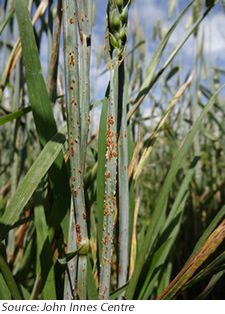
Scientists Develop New Gene-Detecting Technology that Could Bring Super Wheat
May 4, 2016| |

Dr. Brande Wulff from the JIC and colleagues from TSL developed the new technology called ‘MutRenSeq' which accurately identifies the location of disease resistance genes in large plant genomes, and which has reduced the time it takes to clone these genes in wheat from 5 to 10 years down to just two. This technology will allow scientists to very quickly locate resistance genes from crops, clone them, and stack multiple resistance genes into one elite variety.
MutRenSeq is a three step method for quickly isolating resistance genes based on (1) creating mutants from resistant wild type wheat plants and identifying those with loss of disease resistance, (2) sequencing genomes of both wild type resistant plants and those which have lost resistance, and (3) comparing these genes in mutants and wild types to identify the exact mutations responsible for the loss of disease resistance.
In the first test run of MutRenSeq, Dr. Wulff's team successfully isolated a well-known resistance gene, Sr33, in a fraction of the time it had previously taken to do this by conventional breeding techniques. After which, the team then cloned two important stem rust resistance genes, Sr22 and Sr45, which scientists have until now, been unable to isolate successfully.
For more details, read the news release at the John Innes Centre website.
| |
Biotech Updates is a weekly newsletter of ISAAA, a not-for-profit organization. It is distributed for free to over 22,000 subscribers worldwide to inform them about the key developments in biosciences, especially in biotechnology. Your support will help us in our mission to feed the world with knowledge. You can help by donating as little as $10.
-
See more articles:
-
News from Around the World
- From Plant to Crop: The Past, Present, and Future of Plant Breeding
- Uganda's Farmers & Youths Petition Parliament to Pass the Biosafety Bill into Law
- ISAAA Report on Biotech Crops Launched in Burkina Faso
- Scientists Use Nanoparticles to Boost Crop Growth with Reduced Fertilizer
- Texas AgriLife Scientists Study 'War of Plants'
- Prion-like Protein Found in Plants
- Researchers Discover Plant Mechanism that Regulates Flowering in Warm Temperatures
- Plant Biotech Continues to Gain Ground in the Philippines
- Scientists Develop New Gene-Detecting Technology that Could Bring Super Wheat
-
Research Highlights
- Bt Toxin Has No Effects on Survival, Pollen Consumption, or Learning of Honey Bees
- Overexpression of AtGchI Increases Folate Precursors in Common Bean Seeds
-
Beyond Crop Biotech
- The Herring Genome Provides Insight on How Species Adapt to the Environment
-
From the BICs
- UBIC-NARO Showcases Information on Modern Biotech at Agribiz Expo
- Policy Makers Attend Biotech and Biosafety Sensitization Seminar Burkina Faso
-
Announcements
- Banana Research in Africa: Modern Breeding Techniques, Regulatory and Biosafety Issues
-
Read the latest: - Biotech Updates (January 21, 2026)
- Gene Editing Supplement (December 17, 2025)
- Gene Drive Supplement (February 22, 2023)
-
Subscribe to BU: - Share
- Tweet
